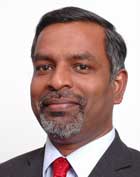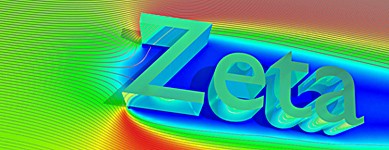Three-Day Workshop on Advanced Computational Fluid Dynamics
Click here for the brochure
Courses Dates
- Advanced Computational Fluid Dynamics, 2014, 14-16 August , 2014, PES University, Bangalore
- Advanced Computational Fluid Dynamics, 2013, 22-24 December, 2013, IIT Madras (link)
Click on the link for details and registration form: ACFD 2014
Courses Details
Course Instructor/Lecturer:
Prof. P. Nithiarasu
Swansea University
Swansea, UK
email: P.Nithiarasu@Swansea.ac.uk
web: http://www.swansea.ac.uk/staff/academic/engineering/nithiarasuperumal/
About the Course
BACKGROUND
The main task of a CFD engineer or scientist is using a readily available software to solve problems or developing a code to test new algorithms. To complete the mentioned task, a fundamental understanding of formulating CFD problems is essential. This include correct representation of initial and boundary conditions, sanity and convergence checks and meshing related issues. In addition to establishing basics of CFD, this workshop will also discuss some practical knowledge essential for both practicing engineers, graduate students and scientists. The course will cover aerospace flows, incompressible flow problems, heat transfer and biomedical flow problems. Participants will have opportunities to discuss their problems of CFD with the instructor. : The main task of a CFD engineer or scientist is using a readily available software to solve problems or developing a code to test new algorithms. To complete the mentioned task, a fundamental understanding of formulating CFD problems is essential. This include correct representation of initial and boundary conditions, sanity and convergence checks and meshing related issues. In addition to establishing basics of CFD, this workshop will also discuss some practical knowledge essential for both practicing engineers, graduate students and scientists. The course will cover aerospace flows, incompressible flow problems, heat transfer and biomedical flow problems. Participants will have opportunities to discuss their problems of CFD with the instructor.
BENEFITS OF ATTENDING THE COURSE
- A basic understanding of how CFD tools are developed and used
- Fundamental understanding of underlying spatial and temporal discretizations
- Understanding how CFD problems are formulated and initial and boundary conditions are determined
- A clear overview on current state of the art, limitations, commercial codes and open sources
WHO SHOULD ATTEND
- Practicing engineers from industry
- CFD researchers in academia
- Scientists and Research Engineers
- CFD Teachers and consultants
- CFD software developers and users
Basic understanding of fluid flow and engineering mathematics is a prerequisite for participating in this workshop.
Course Contents
DAY 1
- 9:00 - 10:00 Introductory lecture
- Practical problems of interest; definitions; why CFD; how reliable CFD is; overall solution procedure of solving a CFD problem; simplification; setting up boundary condition; neglecting unimportant features; interpreting the importance and usefulness of the results.
- 10.00 - 10.30 Coffee break
- 10:30 - 11:30 CFD equations and boundary conditions
- Why knowledge of equations important; Navier-Stokes equations; simplified form; compressible and incompressible flows; convection-diffusion equations for transport processes; characteristic speeds; characteristic variables; determination of right boundary conditions; dangers of imposing wrong boundary conditions.
- 11:40 - 12:40 Numerical methods
- General introduction to numerical methods; finite difference and finite volume methods; discrete boundary conditions and implementation; low and high order methods.
- 12:40 - 14:00 Lunch break
- 14:00 - 15:00 Numerical methods (continued)
- Finite volume method; edge based implementation of finite volume method; finite element method; FVM vs FEM; edge based formulation of FEM method.
- 15:00 - 15:30 Coffee break
- 15:30 - 16:30 Discretization issues
- Stability issues; what can you do to tackle instability issues; damage of adding artificial damping to sensitive problems; instability associated with central difference formulations; order of accuracy; upwinding type stabilization
- 16:30 - 17:00 Exercise and discussions and End of Day 1
DAY 2
- 9:00 - 10:00 Pre-processing
- Geometry construction; CAD geometries; STL geometries; Surface meshing; volume mesh generation; boundary layer mesh construction; convergence issues; time step limits due to meshing; how to avoid problems related to meshing
- 10.00 - 10.30 Coffee break
- 10:30 - 11:30 Problems of practical interest
- Aerodynamic calculations, pre processing issues; boundary conditions; convergence; shock waves; post processing and understanding the results and judgment of correctness; incompressible flow application; boundary conditions; accuracy issues; turbulence modelling and application issues.
- 11:40 - 12:40 Instruction on using CFD codes
- 12:40 - 14:00 Lunch break
- 14:00 - 17:00 Some CFD training
- 17:00 End of Day 2
DAY 3
- 9:00 - 10:00 Fluid-structure interaction
- Monolithic formulation; segregated approach; added mass effect; loosely coupled approach; applications
- 10.00 - 10.30 Coffee break
- 10:30 - 11:30 CFD applications
- Mechanical, medical, aerospace and other applications; formulating a problem; pre-processing; solutions; and interpretation of solutions.
- 11:40 - 12:40 Transport processes
- Energy transfer; mass transfer; free surface modelling; turbulence
- 12:40 - 14:00 Lunch break
- 14:00 - 15:00 Introduction to special topics
- Parallel computing; multigrid method; iterative solvers
- 15:00 - 16:00 Open source solvers and other free resources
- 16:00 - 16:15 Conclusion and feedback
- 16:15 Closure
About the Instructor (P.Nithiarasu)
 Prof. Nithiarasu has over twenty years of experience in developing CFD algorithms, their implementation and problem solving. He has been working on CFD projects funded by NASA, EPSRC and other government organizations and industry. The areas of expertise of Prof Nithiarasu includes compressible and incompressible flows, turbulent flows, FSI, biomedical flows and heat transfer. He has been teaching a graduate course on CFD in Swansea for more than twelve years. Author of two monographs in the area of fluid flow and heat transfer, Prof Nithiarasu has published more than 300 articles in journals and proceedings.
Prof. Nithiarasu has over twenty years of experience in developing CFD algorithms, their implementation and problem solving. He has been working on CFD projects funded by NASA, EPSRC and other government organizations and industry. The areas of expertise of Prof Nithiarasu includes compressible and incompressible flows, turbulent flows, FSI, biomedical flows and heat transfer. He has been teaching a graduate course on CFD in Swansea for more than twelve years. Author of two monographs in the area of fluid flow and heat transfer, Prof Nithiarasu has published more than 300 articles in journals and proceedings.
Prof. Nithiarasu is the founding editor in chief of the International Journal for Numerical Methods in Biomedical Engineering. He serves on the editorial boards of International Journal for Numerical Methods in Fluids, ASME Applied Mechanics Reviews and few other journals.
Prof. Nithiarasu was appointed twice as a distinguished foreign scientist of CSIR, India. He is a winner of ECCOMAS young scientist award and Zienkiewicz silver medal of ICE, London.
E-mail: P.Nithiarasu@swansea.ac.uk
Website: http://www.swansea.ac.uk/staff/academic/engineering/nithiarasuperumal/
